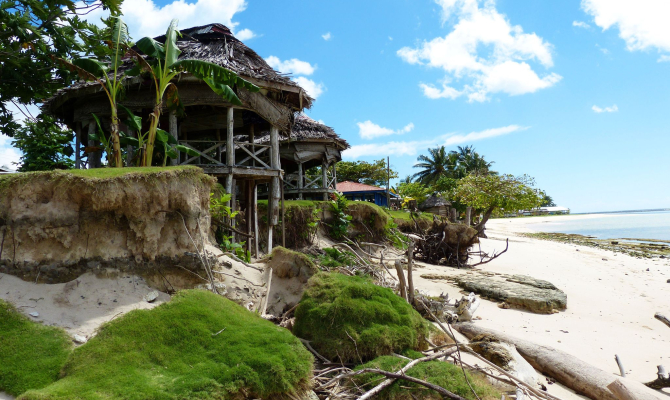Loss and damage caused by the climate crisis was the focus of a half-day in depth workshop for Pacific Small Island Developing States (PSIDS) last Wednesday.
Facilitated by the Secretariat of the Pacific Regional Environment Programme (SPREP) in partnership with Climate Analytics and One CROP, the PSIDS virtual In-depth workshop on Loss and Damage provided a critical opportunity for the Pacific to share experiences and advance discussions on the call for the establishment of a Loss and Damage Finance Facility. This is expected to be a key area of negotiations at the upcoming 27th Session of the Conference of the Parties to the United Nations Framework Convention on Climate Change (COP27) in Egypt.
The Pacific region continues to call for an urgent increase in mitigation ambition.
SPREP’s Director of Climate Change Resilience, Tagaloa Cooper, said loss and damage is already a ‘lived reality’ for Pacific countries and as such it is an ‘utmost priority’ for PSIDS.
The deep dive session allowed the delegates to look at what has been done and consider the emerging opportunities to provide a broader view on the loss and damage landscape and to encourage PSIDS to organise themselves strategically for the global climate change negotiations.
“The plight of the Pacific when it comes to the climate crisis is no longer a secret and it is important to acknowledge that we have failed to “avert” loss and damage,” Cooper said. “While our region continues to call for an urgent increase in mitigation ambition, we are fully aware that, even with recent pledges to reduce emissions in revised NDCs, the Pacific islands are locked into a world of extensive, and potentially existential, loss and damage. As a result, “addressing” loss and damage is crucial for our nations and peoples.”
The concept of Loss and Damage in climate negotiations refers to the consequences of climate change that people have not been able to cope with or adapt to.
At the Glasgow COP 26, the Alliance of Small Island States pressed for establishment of a Finance Facility to provide financial support for countries affected by loss and damage but the idea received pushback from developed countries. The compromise was to agree that the functions of the Santiago Network on Loss and Damage would receive financial support and a set of ‘Glasgow Dialogues’ will be held until 2024 to advance funding discussions.
The first Glasgow Dialogue took place during the 56th meeting of the Subsidiary Bodies in Bonn, Germany, this year where parties negotiated on the institutional arrangements of the Santiago Network. The Santiago Network connects vulnerable developing countries with providers of technical assistance, knowledge, resources they need to address climate risks comprehensively in the context of averting, minimising and addressing loss and damage.
During the in-depth analysis session, the participants expressed grave concerns about loss and damage in the Pacific and reiterated the call for new and innovative sources of finance to begin to address this “lived reality for our region.”
Cooper said the focused discussion on what PSIDS want in terms of a Loss and Damage Finance Facility was extremely important not just for the region but also how SPREP can support its members heading to COP27 in Egypt.
“Time is not on our side. Even where we have begun to “minimise” L&D, the frequency of damaging climate change events leaves no time to “build back better”. These compound and overlapping risks and the continual erosion of our resilience is not fully acknowledged within climate finance regimes. This is why we continue to urgently call on strengthened finance to minimise L&D and new and innovative sources of finance to begin to “address” L&D,” she said.
SOURCE: SPREP/PACNEWS













